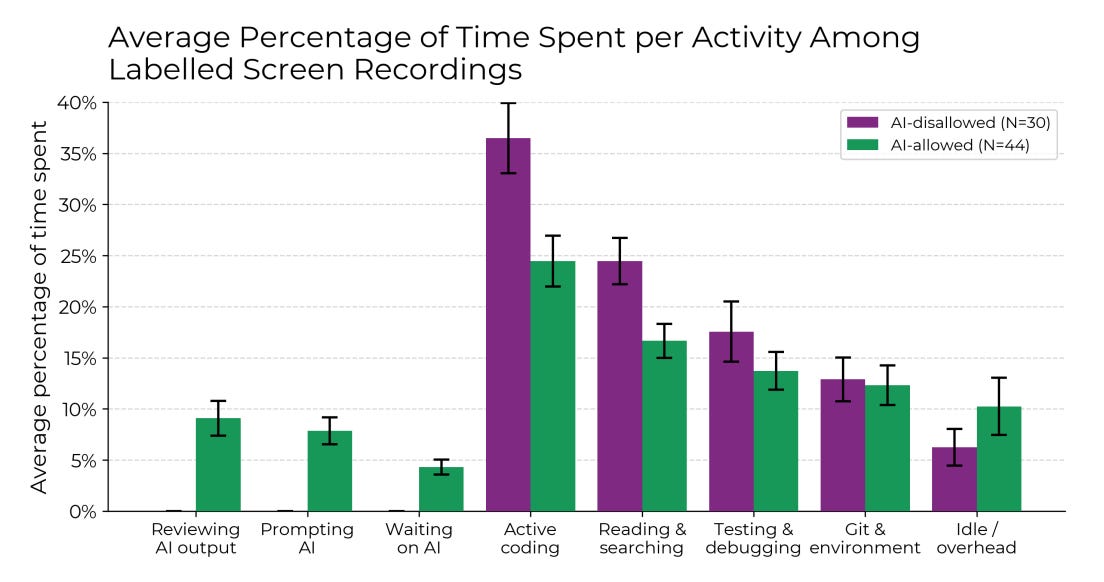
Maskot/Getty Images
AI code editors have quickly become a mainstay of software development, employed by tech giants such as Amazon, Microsoft, and Google.
In an interesting twist, a new study suggests that AI tools might actually be slowing experienced developers down.
Experienced developers using AI coding tools took 19% longer to complete issues than those not using generative AI assistance, according to a new study from Model Evaluation & Threat Research (METR).
Even after completing the tasks, participants couldn’t accurately gauge their own productivity, the study said: The average AI-assisted developers still thought their productivity had gained by 20%.
How the study was set up
METR’s study recruited 16 developers with large, open-source repositories that they had worked on for years. The developers were randomly assigned into two groups: Those allowed to use AI coding assistance and those who weren’t.
The AI-assisted coders could choose which vibe-coding tool they used. Most chose Cursor with Claude 3.5/3.7 Sonnet. Business Insider reached out to Cursor for comment.
Developers without AI spent over 10% more time actively coding, the study said. The AI-assisted coders spent over 20% more time reviewing AI outputs, prompting AI, waiting on AI, or being idle.

METR
A ‘really surprising’ result — but it’s important to remember how fast AI tools are progressing
METR researcher Nate Rush told BI he uses an AI code editor every day. While he didn’t make a formal prediction about the study’s results, Rush said he jotted down positive productivity figures he expected the study to reach. He remains surprised by the negative end result — and cautions against taking it out of context.
“Much of what we see is the specificity of our setting,” Rush said, explaining that developers without the participants’ 5-10 years of expertise would likely see different results. “But the fact that we found any slowdown at all was really surprising.”
Steve Newman, serial entrepreneur and cofounder of Google Docs, described the findings in a Substack post as “too bad to be true,” but after more careful analysis of the study and its methodology, he found the study credible.
“This study doesn’t expose AI coding tools as a fraud, but it does remind us that they have important limitations (for now, at least),” Newman wrote.
The METR researchers said they found evidence for multiple contributors to the productivity slowdown. Over-optimism was one likely factor: Before completing the tasks, developers predicted AI would decrease implementation time by 24%.
For skilled developers, it may still be quicker to do what you know well. The METR study found that AI-assisted participants slowed down on the issues they were more familiar with. They also reported that their level of experience made it more difficult for AI to help them.
AI also may not be reliable enough yet to produce clean and accurate code. AI-assisted developers in the study accepted less than 44% of the generated code, and spent 9% of their time cleaning AI outputs.
Ruben Bloom, one of the study’s developers, posted a reaction thread on X. Coding assistants have developed considerably since he participated in February.
“I think if the result is valid at this point in time, that’s one thing, I think if people are citing in another 3 months’ time, they’ll be making a mistake,” Bloom wrote.
METR’s Rush acknowledges that the 19% slowdown is a “point-in-time measurement” and that he’d like to study the figure over time. Rush stands by the study’s takeaway that AI productivity gains may be more individualized than expected.
“A number of developers told me this really interesting anecdote, which is, ‘Knowing this information, I feel this desire to use AI more judiciously,'” Rush said. “On an individual level, these developers know their actual productivity impact. They can make more informed decisions.”
The post AI coding tools could make experienced software engineers less productive, a new study suggests appeared first on Business Insider.




